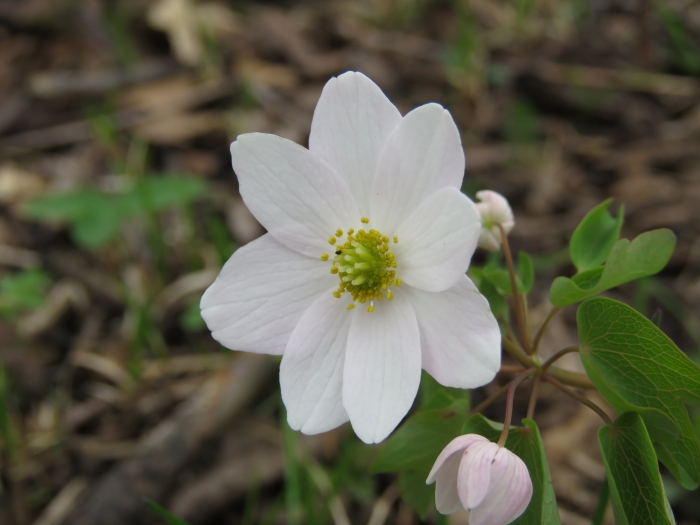Rue Anemone
(Thalictrum thalictroides)
Rue Anemone (Thalictrum thalictroides)
/
/

Katie Kucera
CC BY 4.0
Image By:
Katie Kucera
Recorded By:
Copyright:
CC BY 4.0
Copyright Notice:
Photo by: Katie Kucera | License Type: CC BY 4.0 | License URL: http://creativecommons.org/licenses/by/4.0/ | Rights Holder: Katie Kucera | Publisher: iNaturalist | Date Created: 2019-04-27T08:53:37-07:00 |

















































Estimated Native Range
Summary
Thalictrum thalictroides, commonly known as Rue Anemone, is a deciduous perennial herb native to rich, deciduous woodlands and forest clearings of the Eastern United States and Canada. It typically grows from a cluster of tuberous roots with upright stems reaching 10 to 30 cm (4 to 12 inches) in height. The plant is notable for its delicate, early spring blooms, which appear before the canopy of the forest fully forms. The flowers are borne singly or in small clusters with 3 to 6 flowers per stem. Each flower features a cup of 5 to 10 petal-like sepals, ranging in color from white to pinkish-lilac, and a center filled with numerous yellow stamens surrounding 4-15 carpels. The flowers are held above the foliage on slender stems, creating a subtle yet attractive display.
Rue Anemone is appreciated for its early spring flowers and its ability to thrive in shaded garden spots, mimicking its natural forest floor habitat. It is often used in woodland gardens, shade gardens, and naturalized areas. While it prefers full sun to part shade, it requires protection from harsh afternoon sun in warmer climates. The plant is best suited to moist, well-drained soils rich in organic matter. It is relatively low-maintenance once established but may go dormant in summer if conditions become too dry.CC BY-SA 4.0
Rue Anemone is appreciated for its early spring flowers and its ability to thrive in shaded garden spots, mimicking its natural forest floor habitat. It is often used in woodland gardens, shade gardens, and naturalized areas. While it prefers full sun to part shade, it requires protection from harsh afternoon sun in warmer climates. The plant is best suited to moist, well-drained soils rich in organic matter. It is relatively low-maintenance once established but may go dormant in summer if conditions become too dry.CC BY-SA 4.0
Plant Description
- Plant Type: Herb
- Height: 0.5-0.8 feet
- Width: 0.5-0.8 feet
- Growth Rate: Slow
- Flower Color: Pink, White
- Flowering Season: Spring
- Leaf Retention: Deciduous
Growth Requirements
- Sun: Full Sun, Part Shade
- Water: Medium
- Drainage: Slow
Common Uses
Bank Stabilization, Bee Garden, Butterfly Garden, Deer Resistant, Drought Tolerant, Rabbit Resistant, Rock Garden, Showy Flowers
Natural Habitat
Rich, deciduous woodlands and forest clearings in the Eastern United States and Canada
Other Names
Common Names: Rue-Anemone, Sippruta
Scientific Names: , Thalictrum thalictroides, Anemonella thalictroides, Thalictrum anemonoides, Anemone thalictroides, Syndesmon thalictroides, Anemonella thalictroides f. chlorantha, Thalictrum thalictroides f. duplex, Anemone thalictroides var. uniflora, Anemone uniflora
GBIF Accepted Name: Thalictrum thalictroides (L.) A.J.Eames & B.Boivin